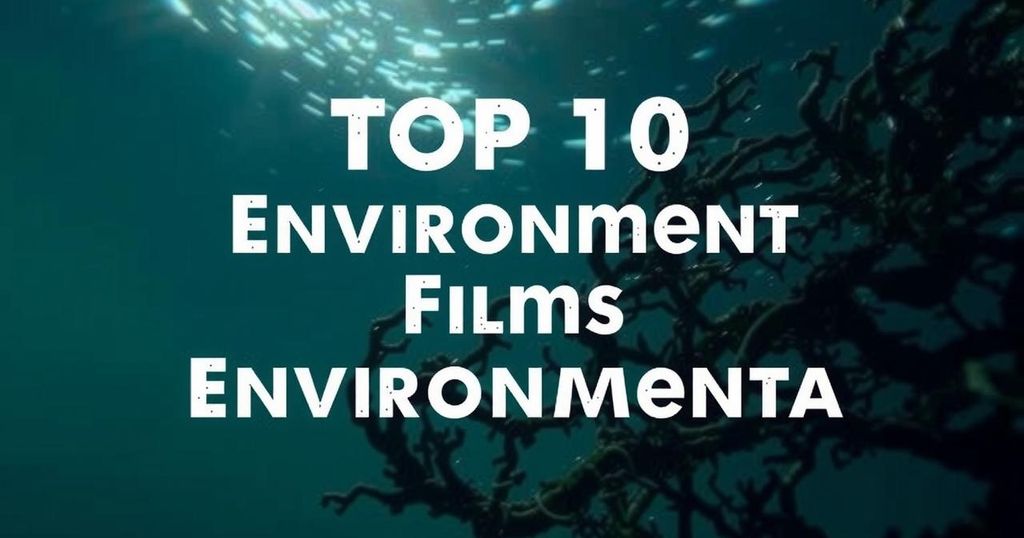The 10 Best Environmental Films: A Call to Action

This article presents a curated list of ten influential environmental films that educate and inspire action against climate change. The selections encompass a variety of genres, all addressing key ecological issues, while showcasing the impact of cinema as a tool for raising awareness and fostering change.
In the face of climate change and environmental degradation, cinema serves as a vital platform for fostering discussions about these pressing issues. The following compilation presents ten influential films that not only entertain but also inspire viewers to reflect on their individual roles in protecting our planet. From psychological dramas to animated adventures, these selections confront environmental challenges and call for action. 1. Interstellar (2014) – Directed by Christopher Nolan, this science fiction epic explores a future in which Earth is no longer habitable. The protagonist, portrayed by Matthew McConaughey, embarks on a mission through a wormhole to find a new home for humanity. The film presents a poignant commentary on the consequences of humanity’s disregard for the environment. 2. Princess Mononoke (1997) – Hayao Miyazaki’s animated classic from Studio Ghibli presents a narrative centered around the conflict between industrialization and the preservation of nature. Through the journey of young warrior Ashitaka, the film offers a complex portrayal of humanity’s relationship with the environment. 3. First Reformed (2018) – In this psychological drama by Paul Schrader, Ethan Hawke stars as a minister contending with a spiritual and ecological crisis. The film effectively critiques corporate involvement in environmental degradation while prompting a dialogue on moral responsibilities regarding climate change. 4. WALL-E (2008) – Directed by Andrew Stanton, this animated feature encapsulates the importance of environmental stewardship through the tale of a waste-collecting robot. The film illustrates themes of pollution and consumerism, all while delivering an uplifting message about hope and renewal. 5. Children of Men (2006) – Alfonso Cuarón directs this dystopian film set in a future where humanity faces extinction due to infertility. The film’s harrowing portrayal of societal collapse serves as a commentary on environmental neglect and social turmoil. 6. Avatar (2009) – James Cameron’s landmark film transports viewers to Pandora, exploring themes of colonialism and environmental exploitation. Through its groundbreaking visuals, Avatar highlights the interconnectedness of all living things and the imperative to protect nature. 7. Annihilation (2018) – Directed by Alex Garland, this eco-horror film follows a biologist on a mission in a mysterious environment undergoing rapid change. Annihilation reflects on humanity’s destructive tendencies and examines nature’s overwhelming power. 8. Isle of Dogs (2018) – In this stop-motion film by Wes Anderson, the story unfolds in a dystopian Japan where dogs have been quarantined. The film addresses themes of environmental degradation wrapped in a unique visual style and heartwarming storytelling.
The exploration of environmental themes within cinema transcends mere entertainment; it becomes a catalyst for societal change. In recent years, filmmakers have increasingly utilized their art to comment on environmental issues, climate change, and the ongoing struggle for sustainability. The selected films exemplify a range of narrative techniques and styles that collectively educate audiences on the importance of preserving our planet. Each film, whether animated or live-action, engages viewers through compelling storytelling while contributing to the discourse surrounding ecological awareness.
In conclusion, the ten films compiled in this list effectively emphasize the importance of environmental awareness and action. Through various genres, these movies tackle critical issues ranging from consumerism and deforestation to the broader impacts of climate change. By engaging with such narratives, audiences are encouraged to reflect on their own behaviors and consider the urgent need to protect our planet for future generations.
Original Source: collider.com







